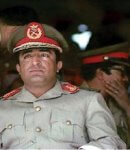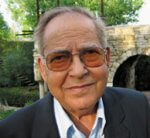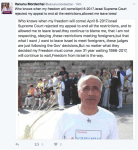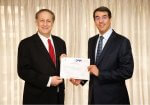Last Lunch—Reflecting on Aljazeera’s Documentary of Yemen’s President Al-Hamdi
By Gamal Gasim

After more than four decades of deliberate regional media oversight, there is now a serious, thought-provoking documentary film on the assassination of Yemen’s popular President, Ibrahim Mohammed Al-Hamdi.
The tragic killing of President Al-Hamdi, alongside his own brother Abd Allah Al-Hamdi and two other French women on October 11, 1977, has been a mysterious political taboo during the entire reign of former President Ali Abd Allah Saleh.
There was never any formal investigation report, investigative journalistic work, or book published on the assassination of President Al-Hamdi.
With Al-Jazeera Arabic’s release of this documentary, the door is now opened for further formal investigation. But the vast majority of Yemeni citizens do affectionately remember President Al-Hamdi as a charismatic leader who had worked conscientiously to build modern state institutions and establish the rule of law in a political culture dominated by tribal politics and political uncertainties.

President Al-Hamdi came to power on June 13, 1974 through a white military coup. Regrettably, his death marked the end of Yemenis’ glittering hope for a modern state and a bright future.
Al-Jazeera Arabic Documentary
Titled “The Last Lunch”, the producers of Al-Jazeera’s documentary have added a metaphorical contour to an ingrained puzzle about the infamous lunch to which Al-Hamdi was reportedly invited at the house of his own vice president, Al-Gashmi, just minutes before his assassination. Al-Jazeera’s documentary began with a brief introduction of the historical political context surrounding the rise of Al-Hamdi’s power when the country was exceedingly vulnerable to Saudi intervention and tribal dominance.
The charismatic leadership of President Al-Hamdi helped solidify his popular support among Yemeni citizens, allowing him to embark on several modernization projects in a country that remained mired in 18th century political institutions and infrastructure. He began to gradually eliminate the tribal influence within the military institution by sacking top military officers with strong tribal affiliations, such as Mujahid Abu Shawarib and Abu Luhoom.
Furthermore, President Al-Hamdi attempted to set a Yemeni tone in regional foreign policy by hosting the Red Sea Security Summit in March 1977, where the leaders of Sudan, South Yemen, and Somalia joined him in the city of Taiz to discuss establishing security arrangements for one of the most important sea routes for oil shipment.
However, the final straw was Al-Hamdi’s policies toward South Yemen that caused enormous fear within Saudi government circles responsible for Yemeni affairs. Indeed, Saudi foreign policy toward Yemen was guided by fear of Yemen becoming a strong, democratic, and unified country.
It was, thus, no coincidence that President Al-Hamdi was killed just one day before his planned historical visit to Aden to celebrate the Yemeni revolution of October 14th and to initiate serious efforts towards the reunification of Yemen, a political dream that had captured the Yemeni imagination for centuries. The assassination of President Al-Hamdi was a last resort, likely after failing to persuade him to delay his unification agenda and change the course of his foreign policy.
The Assassination Plot
It is understandable that the elements of the assassination plot might have been buried with those who attended the infamous lunch- who were either mysteriously killed later or died of terminal diseases such as cancer-or still remain top secrets within the intelligence agencies of western governments such as the United States. Despite this irony, Al-Jazeera’s documentary has succeeded in confirming a number of popular facts about Al-Hamdi’s death.
First, it has confirmed through the testimony of Abd Allah Al-Hakimi that former President Ali Abd Allah Saleh played a big role in the assassination plot. This, in part, could explain Saleh’s unexpected ascending to the presidency backed by Saudi Arabia and unchallenged by the United States.
Ironically, former President Saleh admitted several months before his assassination in late 2017 that it was Saudi Arabia behind the assassination of President Al-Hamdi. It was the first time that Saleh made such a reference in a public interview. He specifically accused the Saudi military attaché in Sana’a, Saleh Al-Hidyyan, of being the mastermind behind Al-Hamdi’s plot.
However, Saleh did not explain why he hid this fact from his people for nearly forty years. Beside Saleh, the chief suspects of Al-Hamdi’s assassination included Al-Hamdi’s vice president, Ahmed Al-Ghashmi, who himself was later assassinated at his own presidential office in another bomb hidden in a diplomatic bag delivered by a Southern Yemeni delegate, though it was not clear whether this diplomat was aware of this suicidal mission or not. In fact, Al-Jazeera’s documentary was the first media outlet ever to show unseen photos of Al-Ghashmi’s office after explosion.
Second The documentary film shed an important light on the lives of the two French women killed together on the same day of Al-Hamdi’s assassination. Al-Hamdi’s assassins attempted not only to eliminate Al-Hamdi and his brother physically but also to smear their characters by implying that the two brothers had an affair with these two French women who were on a furtive visit to Yemen.
The public received this political rumor with nothing but great repugnance and rejection. Aside from a brief moment of grief at the United Nations for the death of Al-Hamid, the international community has remained quite silent with no serious call for investigation.
The Saudi government in a rare move announced officially that it had no link whatsoever to this plot. Moreover, the shadowy silence of the French government about the killing of these two French women could be due to the concern of losing its economic interests in Yemen especially after securing an important telecommunication contract with the Yemeni government. Al-Jazeera’s documentary disclosed the connection between one of these two French victims and the French intelligence agency indicating that the French government might have also been more interested in demanding monetary compensation from the Yemeni government than calling for a serious criminal investigation.
Al-Jazeera’s documentary helped launch the first step toward full investigation of Al-Hamdi’s death. Still many documents remain classified as top secrets within some security and intelligence circles that hopefully someday would help answer some enduring questions. Hopefully, there will be soon a book or a formal Yemeni committee to investigate the most important page in Yemen’s modern history.
(Gamal Gasim, associate professor of Middle East Studies and Political Science at Grand Valley State University, earned his PhD in political science from Texas Tech. Before Grand Valley, he taught at Texas Tech, University of Wisconsin-Madison during the summers of 2006 and 2007, and at the University of Illinois at Urbana-Champaign and Beloit College during the summers of 2008 and 2009 respectively. His research interests include comparative politics, Middle East politics, Islamic civilization, Islamic political parties and Muslim Americans. He has contributed articles to Islam and Christian–Muslim Relations, Studies in Ethnicity and Nationalism, Politics & Religion, Electoral Studies, The Journal of Political Science Education, The Oxford Encyclopedia of Islam and Politics and other journals.)


- Israelisnipers shooting and killing hospital workers in Gaza - December 11, 2023
- CAIR Condemns Israeli Executions of Wounded, Unarmed Palestinian in West Bank - December 11, 2023
- Arab and Muslim American voters face a “simple choice” between Biden’s inhumanity and Trump’s edgy politics - December 9, 2023

























Comment on “Last Lunch—Reflecting on Aljazeera’s Documentary of Yemen’s President Al-Hamdi”